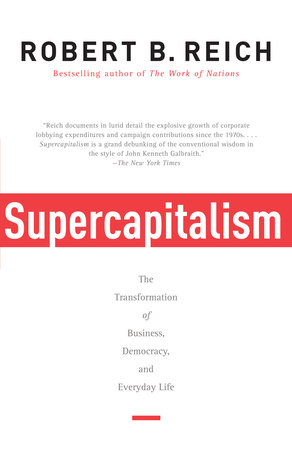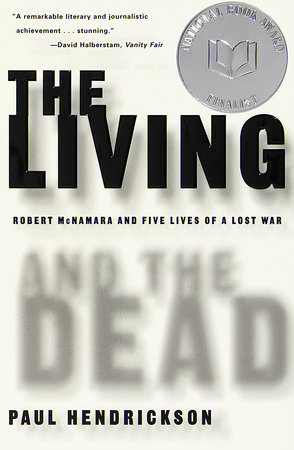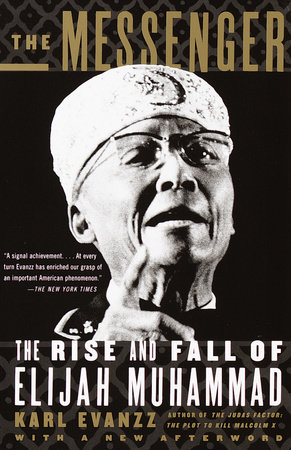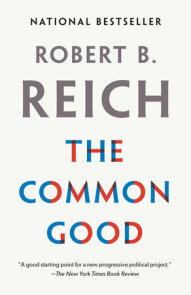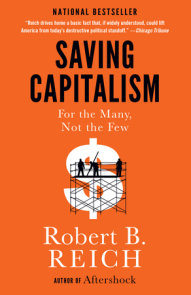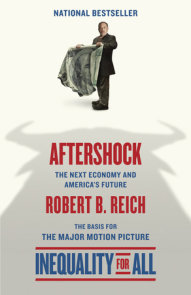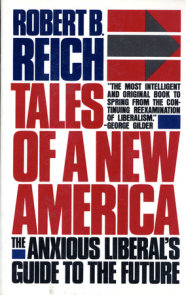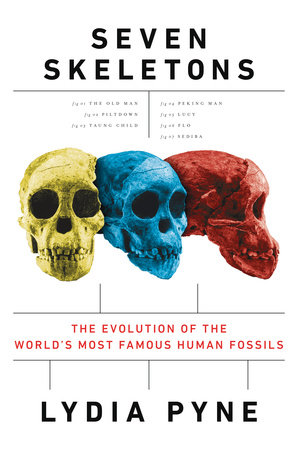Author Q&A
Q: What exactly is Supercapitalism?
A: It’s a turbo-charged, Web-based system in which anyone can buy almost anything anywhere on the planet. It’s powered by consumers and investors who search for great deals around the world with the click of a computer mouse. As a result, companies are in more intense competition than ever to attract and keep customers and shareholders.
Q: So it’s good, right?
A: Well, consumers and investors have never had it so good. Just look at how plentiful our choices have become over the past few decades. There used to be only three big auto companies, one telephone company, three tv channels, and one or two local savings banks, for example. And many products have become cheaper in real terms, with lots of innovations. Medical technology has made huge advances, and the average life span has increased dramatically. Look also at how the stock market has soared — the Dow went from 600 in 1980 to over 1300 today.
Q: Any downsides to supercapitalism?
A: You bet. Inequality hasn’t been this wide in 80 years. Jobs are far less stable, and the median wage is below where it was in 1980, adjusted for inflation. Main Streets are disappearing. And our planet’s environment is endangered.
Q: How are these bad trends connected to the good ones?
A: Where do we suppose the great deals come from? In part from lower payrolls — from workers who have to settle for lower wages and benefits. Or from companies that fight off unions. Or from CEOs and financiers who earn vast fortunes making ruthless decisions insuring the best deals for consumers and investors. Or from big-box retailers that kill off Main Streets because they undercut prices charged by independent retailers. Or from companies that pay pennies to twelve-year-olds in poor countries and wreak havoc on the environment. Today’s economy can give us great deals but too often at the expense of our common values.
Q: Aren’t you letting corporations off the hook?
A: Corporations are responding to our demands as consumers and investors. They have to, to stay competitive.
Q: So do you think this Faustian bargain is inevitable — that we’re trapped in it?
A: Not necessarily. That’s where democracy comes in. You see, we’re not just consumers and investors. We’re also citizens who have concerns about the common good. Democracy is a system for accomplishing what can only be achieved by citizens joining together with other citizens — to determine the rules of the game whose outcomes express that common good. Most of us don’t want to live in a two-tiered society divided between the very rich and the very poor, with a shrinking middle class. Most of us want stable jobs and stable neighborhoods, and we value our Main Streets. We want a sustainable environment. Most of us don’t want to exploit young children in poor nations.
Q: So there are tradeoffs?
A: Yes. The easier it is for us as consumers and investors to get better deals, the more intense the competition becomes among companies for our dollars. And the more intense that competition, the worse the consequences for many values we hold in common — including equality, steady jobs, Main Streets, the environment, and human rights at home and abroad.
Q: But you say we’re not addressing these tradeoffs. Why not?
A: Because democracy isn’t working. This is the central paradox of our age. Capitalism is triumphing but democracy is failing. We used to think of the two as linked. In fact, we used to call our system "democratic capitalism" — with the democratic process deciding the rules of the game and companies battling it out within those rules. But supercapitalism has replaced democratic capitalism. The consumers and investors in us have trumped the citizens in us. Although we’re doing better and better as consumers and investors, most of us feel less and less effectual as participants in a democracy.
Q: Why is democracy failing?
A: Because supercapitalism has overwhelmed politics. Remember, companies are in more intense competition than ever. Goaded by us, they have to do whatever is necessary to gain and keep competitive advantage. What drives this escalation is the fact that public policies often help some companies or industries while putting rivals at a disadvantage. As competition has intensified, so has this arm’s race. It’s no coincidence that there has been a mammoth increase in Washington lobbyists over the last twenty-five years (from 5,500 to over 32,000), Washington lawyers (26,000 to 77,000), corporate public relations specialists, and corporate-related campaign contributions.
Q: What can be done?
A: The real challenge is to keep the two realms — capitalism and democracy — separate. We have to end the corporate arm’s race. That means strict limits on corporate lobbying, on corporate spending for public relations intended to influence legislation, on legislators and public officials turning to lobbying when they leave office, and on corporate money otherwise flowing in politics.
Q: Easy to say, but isn’t that just about impossible to do?
A: Hard, but not impossible. Remember — it’s an arms race. Many corporations would rather not pay these escalating costs if they could be certain their competitors would refrain as well.
Q: How do we begin?
A: The first step is for the public — and the media — to give up several myths that distract us from genuine reform.
Q: What myths?
A: For example, beware of politicians or advocates who blame corporations and CEOs for the negative social consequences of supercapitalism — such as low or declining wages, job losses, widening inequality, loss of community, and global warming. For example, stop blaming Wal-Mart. Corporate executives are responsible for obeying the law but they can’t be more generous than the law requires. It’s illogical to criticize companies for playing by the current rules of the game. If we want them to play differently, we have to change the rules.
Q: Are you also suggesting we shouldn’t believe corporations or their spokesmen when they say they’re doing something to advance the public good or fulfill their social responsibilities?
A: Exactly. The bottom line is that companies aren’t in the business of the public good; they’re in the business of turning a profit. They may do good things to improve their brand image and curry favorable public opinion, so as to increase sales and profits. But they won’t act in the public interest at the expense of profits, and we can’t expect them to. The only way to get companies to do what’s in the public interest rather than purely in the interests of consumers and investors is to pass laws requiring them to do so.
Q: Any other myths?
A: The most basic myth is that corporations are people. As a result of this fallacy, the public assumes companies have duties and rights that properly belong to people. This blurs the boundary between capitalism and democracy, and leads to a host of bad public policies.
Q: Bad policies like what?
A: Consider the corporate income tax. Companies don’t really pay it; people do. The tax is passed on mostly to shareholders and to some extent employees and consumers. The false idea that companies pay taxes leads to the conclusion that they deserve to be represented in the political process. It would be more logical to get rid of the corporate income tax and have shareholders pay taxes on all income earned by the corporation on their behalf.
Q: You’re also saying that under supercapitalism, corporations can’t be moral or immoral, patriotic or unpatriotic, generous or greedy?
A: Exactly. That’s why it’s nonsensical to hold companies such as Arthur Andersen criminally liable, rather than the specific people responsible for breaking the law. Similarly, it’s illogical to confer on American-based companies special benefits or responsibilities because of their presumed American identity. Most companies these days are becoming part of an integrated global economy, and have worldwide connections regardless of where they’re based. And it’s nonsensical to depend on corporate generosity to solve public problems. Corporations aren’t charitable institutions.
Q: So corporations have no legitimate role in the political process?
A: Only people do. Shareholders themselves should be able to express their interests, but that’s different than the corporation doing so on their behalf. In fact, there should be "stockholder protection" laws analogous to "paycheck protection laws" (designed to protect union members from paying dues in support of union political activities they oppose). Stockholder protection laws would require that shareholders specifically agree to any corporate political activity. For example, if a company dedicates $100,000 to lobbying in a given year, shareholders who object would get a special dividend or additional shares representing their pro rata share of that expenditure.
Q: Are you optimistic?
A: Yes. While the triumph of supercapitalism has led, indirectly and unwittingly, to the decline of democracy, it’s not inevitable. We can have a vibrant democracy as well as vibrant capitalism. But to accomplish this, the two spheres must be kept distinct. The purpose of capitalism is to get the best deals for consumers and investors. The purpose of democracy is to accomplish ends we can’t achieve as individuals — and to set the rules of the capitalist game. We’re all consumers and many of us are investors, but these private benefits often come with social costs. We’re also citizens who have a right and a responsibility to participate in a democracy, and reduce those social costs. We can accomplish this larger feat only if we take our roles as citizens seriously, and protect our democracy. The first step, which is often the hardest, is to get our thinking straight.
